Resources
Style
Planning
View All
THE blog
Written by: Lauren Chamberlain
Edited and Reviewed By: Anabelle Clebaner MS, RDN
Thinking about starting a family? Have you ever wondered what you can do before trying to conceive to boost your chances of a healthy pregnancy? Your fertility journey starts long before a positive pregnancy test. Preparing for pregnancy isn’t just about tracking ovulation and taking prenatal vitamins—it’s about optimizing your entire body for conception and a healthy pregnancy. Scientific research increasingly shows that preconception health plays a crucial role in reproductive success and fetal development. Here are five key areas you can’t afford to skip when getting ready to grow your family.
1. Support Your Gut Health
Your digestive system isn’t just about breaking down food—it’s a complex ecosystem that plays a central role in your overall health, including fertility. A healthy gut microbiome, which refers to the trillions of bacteria, fungi, and other microbes living in your digestive system, influences numerous physiological functions, from hormone regulation to immune function and even mood.
The connection between gut health and fertility is emerging as an important area of study. Research increasingly shows that an imbalanced gut microbiome, also known as dysbiosis, can have a significant impact on fertility. When the gut microbiome is out of balance, it can lead to inflammation, hormonal imbalances, and poor nutrient absorption—all of which can affect your ability to conceive.
The Gut Microbiome and Hormone Regulation
A healthy gut microbiome is essential for maintaining hormonal balance, which is crucial for fertility. The gut bacteria help metabolize estrogens, which are important for regulating the menstrual cycle and maintaining a healthy ovulation pattern. Dysbiosis has been linked to estrogen dominance, which can interfere with ovulation and lead to conditions like polycystic ovary syndrome (PCOS), a common cause of infertility.
The microbiome also plays a key role in detoxifying estrogen and other hormones, helping to prevent an overload of hormones that can disrupt your reproductive system. When the gut is not functioning optimally, it can lead to a build-up of excess estrogen in the body, a condition known as estrogen dominance, which can impact fertility and cause other reproductive health problems.
Gut Health and Immune Function
In addition to influencing hormones, the gut microbiome also affects your immune system. Around 70% of the body’s immune cells reside in the gut, and the microbiome plays a vital role in maintaining immune balance. A healthy immune system is essential for fertility because an overactive or dysfunctional immune response can interfere with embryo implantation and fetal development. Chronic inflammation in the gut can trigger an autoimmune response, leading to complications in fertility and pregnancy.
Studies have shown that women with autoimmune diseases, such as endometriosis or thyroid disorders, often have gut dysbiosis, which could be contributing to their fertility struggles. This means addressing gut health may also help reduce inflammation and autoimmune responses, creating a more favorable environment for conception and pregnancy.
The Role of Diet in Gut Health
Your diet plays a crucial role in shaping your gut microbiome. The foods you eat provide fuel for your gut bacteria, and by choosing nutrient-dense, whole foods, you can encourage the growth of beneficial microbes that support both gut and reproductive health.
To promote a healthy gut microbiome and support fertility:
- Eat fiber-rich foods: A diet high in fruits, vegetables, whole grains, and legumes provides the necessary fiber to feed beneficial gut bacteria. Fiber acts as a prebiotic, helping to nourish the good bacteria in your gut that help regulate hormones and immune function.
- Include fermented foods: Fermented foods such as yogurt, kefir, sauerkraut, kimchi, and kombucha contain probiotics, which are live beneficial bacteria that help restore balance to the gut microbiome. These foods support the growth of healthy bacteria, improve digestion, and reduce inflammation, all of which are essential for fertility.
- Limit processed foods and sugar: Processed foods, refined sugars, and artificial sweeteners can encourage the growth of harmful bacteria in the gut, leading to an imbalance in the microbiome. This imbalance can contribute to inflammation and poor immune function, both of which can hinder fertility.
Addressing Gut Dysbiosis for Fertility
If you suspect that gut dysbiosis may be affecting your fertility, it’s important to work with a healthcare professional, such as a dietitian or functional medicine practitioner, to assess and address the issue. Common signs of dysbiosis include digestive symptoms like bloating, gas, constipation, diarrhea, and food intolerances. A professional can help guide you through dietary changes and supplements, such as probiotics or antimicrobial herbs, to support gut health and restore balance to your microbiome. Some studies have suggested that the use of probiotics and other gut-healing supplements may improve fertility outcomes, particularly in women with PCOS and other reproductive health conditions.
By supporting your gut health, you’re not just promoting better digestion and immune function—you’re creating a favorable environment for fertility.
Learn more about gut health and fertility
2. Balance Blood Sugar
Maintaining balanced blood sugar is crucial for overall health, especially when preparing for pregnancy. Blood sugar imbalances, such as insulin resistance and high blood glucose levels, can interfere with ovulation, hormone production, and overall fertility. In fact, managing blood sugar levels can be one of the most effective ways to optimize reproductive health and enhance fertility. Here’s why blood sugar balance matters and how you can achieve it.
How Blood Sugar Affects Fertility
Blood sugar imbalances, particularly insulin resistance, can have a significant impact on fertility. Insulin is a hormone that regulates blood sugar levels, and when the body becomes resistant to insulin, it needs to produce more of it to maintain normal blood glucose levels. High insulin levels can disrupt the balance of other hormones that regulate reproductive function, such as estrogen, progesterone, and testosterone. In addition to disrupting ovulation, high insulin levels can also impact the quality of the eggs and the ability to support a pregnancy.
The Link Between Blood Sugar and Hormone Imbalance
The relationship between blood sugar and hormone balance is intricate. Insulin not only regulates glucose levels but also interacts with other hormones like cortisol, leptin, and thyroid hormones, all of which play essential roles in fertility. High insulin levels can lead to an imbalance in these hormones, affecting reproductive function.
For example:
- Cortisol: Chronic stress and high blood sugar levels can elevate cortisol, a stress hormone that disrupts hormone production and reduces fertility. High cortisol levels can lead to irregular menstrual cycles and impair ovulation.
- Leptin: Leptin is a hormone produced by fat cells that helps regulate appetite, metabolism, and reproductive function. Imbalances in leptin levels, often seen in individuals with insulin resistance, can interfere with ovulation and menstrual regularity.
- Insulin resistance can also disrupt thyroid function, which is crucial for fertility. Studies have shown that insulin resistance can lead to hypothyroidism (low thyroid function), which can cause menstrual irregularities, poor egg quality, and difficulty getting pregnant.
How to Balance Blood Sugar for Fertility
Achieving and maintaining stable blood sugar levels is a key factor in preparing for pregnancy. Here are some practical steps you can take to balance your blood sugar:
Prioritize Protein, Fiber, and Healthy Fats
Including a balance of protein, fiber, and healthy fats at each meal can help stabilize blood sugar levels. These nutrients slow the absorption of glucose into the bloodstream, preventing spikes in blood sugar. Focus on lean protein sources (such as chicken, fish, tofu, and legumes), fiber-rich vegetables and whole grains, and healthy fats (like avocado, nuts, and olive oil).
Minimize Refined Carbs and Sugar
Refined carbohydrates (such as white bread, pasta, and baked goods) and sugary foods cause rapid spikes in blood sugar, followed by crashes that can lead to insulin resistance over time. Instead, opt for whole grains, vegetables, and fruits that release sugar more slowly into the bloodstream, providing a steady supply of energy.
Regular Physical Activity
Exercise, especially strength training, helps improve insulin sensitivity, meaning your body uses insulin more effectively to regulate blood sugar. Studies have shown that regular physical activity, including moderate aerobic exercise and strength training, can improve metabolic function and support healthy hormone levels, thereby enhancing fertility.
Manage Stress
Chronic stress can elevate cortisol levels, which in turn disrupt blood sugar regulation and fertility. Incorporating stress-management techniques such as deep breathing, meditation, yoga, or spending time in nature can help lower cortisol levels and improve overall hormonal balance.
Consider Supplements
Certain nutrients, such as magnesium, chromium, and omega-3 fatty acids, may help support healthy blood sugar metabolism. Magnesium, in particular, is important for insulin function, and research has shown that adequate magnesium levels are associated with better fertility outcomes.
Managing blood sugar not only supports fertility but also helps set the stage for a healthy pregnancy by lowering the risk of complications like gestational diabetes.
Explore blood sugar management strategies
3. Detox Your Environment
Endocrine-disrupting chemicals (EDCs), found in plastics, pesticides, pollution, and personal care products, can interfere with hormone balance and reproduction. Research shows that exposure to EDCs—such as BPA, phthalates, and pesticides—can affect fertility by disrupting hormone production and ovarian function.
The 4 P’s to Avoid:
- Plastics: Opt for glass or stainless steel for food storage and drink containers to reduce exposure to BPA and phthalates, which have been linked to reduced ovarian reserve and lower sperm quality.
- Pesticides: Choose organic produce when possible and thoroughly wash fruits and vegetables. Pesticides can disrupt estrogen and progesterone levels, hindering reproductive success.
- Pollution: Use air purifiers and avoid high-traffic areas to minimize exposure to air pollution, which can lower fertility rates and increase miscarriage risk.
- Personal Care Products: Swap conventional beauty, skincare, and cleaning products for non-toxic alternatives. Parabens and synthetic fragrances found in many products are linked to hormone disruption and reduced fertility.
Reducing your exposure to these toxins can help protect your hormones and reproductive health.
Learn more about reducing toxic exposure
4. Optimize Sleep & Manage Stress
Poor sleep and chronic stress can raise cortisol levels, negatively impacting reproductive hormones and fertility. Disrupted sleep patterns—such as waking up between 1-3 AM—may indicate liver detoxification issues, while difficulty staying asleep or waking up feeling unrested often correlates with low progesterone levels. Stress can lead to irregular cycles, making conception more difficult.
Studies show that sleep disturbances and high stress levels can disrupt menstrual cycle regularity, reduce ovarian function, and even affect early pregnancy outcomes.
To improve sleep and reduce stress:
- Stick to a consistent sleep schedule, even on weekends.
- Avoid blue light exposure from screens at least an hour before bed.
- Create a calming nighttime routine—try magnesium, herbal teas, or journaling.
- Get sunlight exposure in the morning to regulate circadian rhythms.
Stress-reducing activities like meditation, breathwork, and yoga can support your fertility by lowering cortisol levels.
5. Assess Your Partner’s Health
Fertility is a team effort! Around 40% of infertility cases involve male factors, and sperm health plays a major role in conception. Changes in diet, lifestyle, and environmental exposure can improve sperm quality, motility, and count. Since sperm takes about 74 days to regenerate, it starts by making changes at least three months before conception.
To support male fertility:
- Nutrient-dense foods rich in zinc, selenium, omega-3 fatty acids, and antioxidants are essential for sperm health. Zinc and selenium, in particular, play critical roles in sperm formation and motility.
- Limit alcohol and cannabis use, as both can reduce sperm concentration and motility.
- Avoid excessive heat—hot tubs, saunas, and even laptops on laps can lower sperm count. The testes require a cooler temperature for optimal sperm production.
- Reduce stress—high cortisol levels can lower testosterone and sperm quality.
The father’s lifestyle before conception can influence the baby’s long-term health through epigenetic changes, which may affect gene expression in both parents.
Learn more about understanding cortisol
The Bottom Line
Prepping for pregnancy isn’t just about waiting for a positive test—it’s about creating the healthiest possible environment for conception and beyond. By addressing gut health, blood sugar balance, environmental toxins, sleep, and both partners’ health, you’re laying the groundwork for a smoother fertility journey. Small, intentional choices today can make a big difference tomorrow. Take control of your health today!
Start your journey to optimal fertility
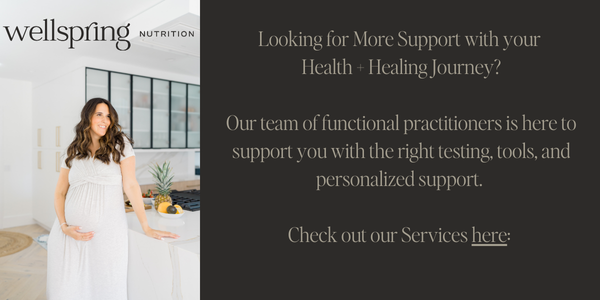
Sources
https://pmc.ncbi.nlm.nih.gov/articles/PMC9603966
https://pmc.ncbi.nlm.nih.gov/articles/PMC5052775
https://www.sciencedirect.com/science/article/pii/S245196502030079X
https://www.cdc.gov/genomics-and-health/epigenetics/index.html
https://www.hopkinsmedicine.org/health/wellness-and-prevention/planning-a-pregnancy
https://pmc.ncbi.nlm.nih.gov/articles/PMC6075697
https://pmc.ncbi.nlm.nih.gov/articles/PMC4145858

By: Anabelle Harari Clebaner MS, RDN
Diet impacts everything
Want to boost fertility? 🌟 Start with what’s on your plate. Yep, your diet can make a HUGE difference.
When it comes to fertility, adequate nutrition plays a pivotal role. The right nutrients can significantly influence your reproductive health, improving your chances of conception and a healthy pregnancy.
As a fertility dietitian, I know firsthand just how much nutrition makes an impact on your reproductive health, after working with hundreds of women in my private practice, Wellspring Nutrition.
Think of it this way – you have three opportunities every single day to make a healthy choice that nourishes your body for fertility and pregnancy.
So let’s get right into it – here are 5 foods you can start to incorporate or increase in your diet to start to see positive changes in your fertility.
Leafy greens: The superstars 🌿
Spinach, kale, and their leafy friends are packed with folate, iron, and antioxidants.
Folate is essential for: DNA synthesis and repair, embryonic development, and preventing neural tube defects.
Folic acid is crucial for both men and women. For women, it helps create a healthy environment for egg fertilization and early embryonic growth. For men, it supports healthy sperm production.
Iron is essential for: Hemoglobin production and oxygen transport.
Adequate iron levels prevent anemia, which can affect ovulation and overall energy levels, making your body more conducive to conception.
These nutrients are your fertility BFFs. Add them to salads, smoothies, or soups. Easy peasy!
Fatty fish: Omega-3 magic 🐟
We can’t have a conversation about Omega-3 fats without also talking about Omega-6 fats.
Both Omega-3 and Omega-6 fatty acids are essential polyunsaturated fats, meaning your body cannot produce them, and they must be obtained through your diet. Despite being in the same family of fats, they have different roles and effects on the body.
The three most important types are:
– **EPA (Eicosapentaenoic Acid)**: Found in fatty fish such as salmon, mackerel, and sardines. – **DHA (Docosahexaenoic Acid)**: Also found in fatty fish and is a crucial component of brain and eye health.
– **ALA (Alpha-Linolenic Acid)**: Found in plant sources like flaxseeds, chia seeds, and walnuts.
ALA can be converted to EPA and DHA in the body, but this process is relatively inefficient.

Health Benefits
**Anti-Inflammatory**: Omega-3s help reduce inflammation in the body, which can lower the risk of chronic diseases such as heart disease and arthritis. – **Cardiovascular Health**: They are known for their heart-protective effects, reducing blood pressure, and improving cholesterol levels. – **Mental Health**: Omega-3s play a crucial role in brain health and have been linked to reduced symptoms of depression and anxiety. – **Fertility**: As mentioned earlier, they improve egg quality, regulate ovulation, and reduce the risk of endometriosis.
Omega-6 Fatty Acids
Types
The most common type is: – **LA (Linoleic Acid)**: Found in vegetable oils like sunflower, soybean, and corn oil. – **AA (Arachidonic Acid)**: Found in meat and eggs; it is derived from LA. – **GLA (Gamma-Linolenic Acid)**: Found in evening primrose oil and blackcurrant seed oil; it’s a less common omega-6.
Health Benefits
**Pro-Inflammatory and Anti-Inflammatory**: Omega-6 fats can produce both pro-inflammatory and anti-inflammatory compounds. The body’s balance of omega-6 to omega-3 determines the effect. – **Skin Health**: Omega-6 fatty acids can help support skin barrier function and hydration. – **Growth and Development**: Essential for normal growth and brain function, particularly in children.
Key Differences
**Balance and Ratio** – **Ideal Ratio**: Historically, humans consumed Omega-3 and Omega-6 fats in a balanced ratio of about 1:1 to 1:4. However, modern diets tend to have a ratio closer to 1:20 or 1:30, significantly skewed towards Omega-6, leading to an imbalance.
**Health Impact**: An imbalanced ratio (high in Omega-6 and low in Omega-3) can promote inflammation and contribute to chronic diseases. Ensuring an adequate intake of Omega-3s while reducing excessive Omega-6s can optimize health.
Sources
**Omega-3s**: Primarily found in fatty fish (salmon, mackerel, sardines), flaxseeds, chia seeds, walnuts, and algae.
**Omega-6s**: Found mostly in vegetable oils, nuts, seeds, and processed foods. They are more prevalent in the typical Western diet.
While both Omega-3 and Omega-6 fatty acids are essential for health, maintaining a proper balance between them is crucial. Increasing your Omega-3 intake and being mindful of Omega-6 consumption can help in achieving better overall health and reducing the risk of chronic diseases.
Omega-3 Fatty Acids are Essential for: Reducing inflammation, hormone production, and cell membrane function.
Omega-3 fatty acids are known to improve egg quality, regulate ovulation, and reduce the risk of endometriosis. For men, they improve sperm quality and mobility.
So where do you find Omega-3 fatty acids? Salmon, mackerel, and sardines are where it’s at. These fatty fish are fertility wonders. Grill ’em, bake ’em, or toss ’em in a salad. Your future self will thank you.
Nuts and seeds: Tiny powerhouses 🥜
Pumpkin seeds, walnuts, and almonds are considered tiny powerhouses because they are bursting with zinc and selenium. When it comes to fertility, both zinc and selenium play critical roles in ensuring optimal reproductive health. These essential trace minerals are involved in numerous bodily functions, specifically those related to reproductive health for both men and women.

Zinc
Zinc is vital for:
- Hormone Regulation: Zinc helps in regulating hormone levels, particularly testosterone in men and estrogen and progesterone in women. Balanced hormone levels are crucial for a healthy reproductive system.
- Sperm Production and Quality: In men, zinc is essential for spermatogenesis, the process of sperm production. It also enhances sperm motility and morphology, crucial factors for successful fertilization.
- Ovulation: For women, zinc supports the maturation of eggs and ensures regular ovulation, which is essential for conception.
- DNA Synthesis: Zinc is involved in DNA synthesis and cell division, processes that are fundamental during the early stages of fetal development once conception occurs.
Selenium
Selenium contributes to fertility by:
- Antioxidant Support: Selenium acts as a powerful antioxidant, protecting reproductive cells from oxidative stress, which can damage sperm and eggs.
- Thyroid Function: Proper thyroid function, supported by selenium, is crucial for fertility. The thyroid gland regulates many metabolic processes, including those that affect reproductive health.
- Sperm Quality: In men, selenium is essential for the formation and motility of sperm. It helps in maintaining the integrity and function of sperm cells.
- Development: Selenium plays a role in the early stages of embryo development by ensuring proper DNA synthesis and protecting against cellular damage.
Snack on them, throw them in your oatmeal, or mix them in a trail mix – there’s no way to go wrong here! And if you want to learn more about seed cycling, check out this blog right here.
Berries: Antioxidant champs 🍓
Blueberries, strawberries, and raspberries are loaded with antioxidants. These little champs keep your reproductive system in top shape. Enjoy them fresh, frozen, or in a smoothie. Yum!
Antioxidants are compounds that help protect the body from oxidative stress, which is caused by an excess of free radicals—unstable molecules that can damage cells.
Free radicals are naturally produced during metabolism, but environmental factors like pollution, UV exposure, and poor diet can increase their levels.
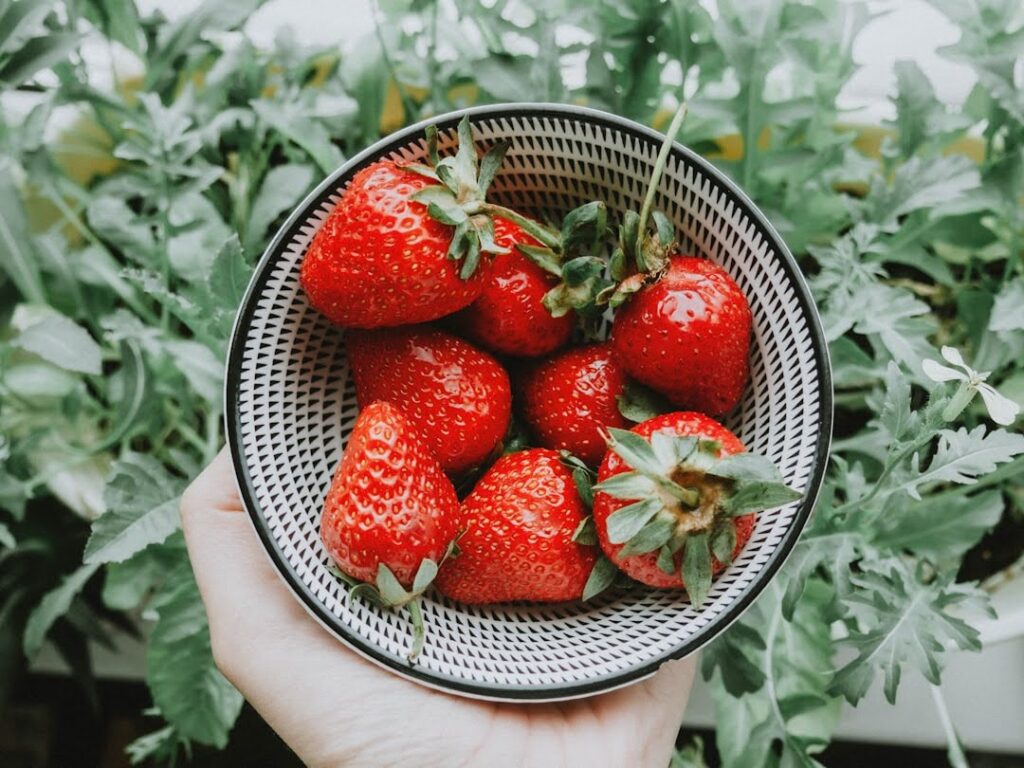
Berries Images – Free Download on Freepik
Importance of Antioxidants for Fertility
1. **Protecting Reproductive Cells**: Antioxidants help neutralize free radicals, reducing oxidative stress on reproductive cells like sperm and eggs. This protection is crucial for maintaining the health and viability of these cells.
2. **Improving Egg Quality**: Oxidative stress can negatively affect egg quality, leading to issues like chromosomal abnormalities. Antioxidants can improve the quality and viability of eggs by reducing this stress.
3. **Enhancing Sperm Health**: In men, antioxidants play a vital role in protecting sperm from oxidative damage, which can affect sperm count, motility, and overall fertility.
4. **Supporting Hormonal Balance**: Certain antioxidants, like vitamin E and Coenzyme Q10, are involved in hormone production and regulation, which is essential for fertility.
5. **Reducing Inflammation**: Antioxidants like vitamin C, E, and selenium have anti-inflammatory properties, which can help reduce inflammation in the reproductive organs, supporting overall fertility.
Including a variety of antioxidant-rich foods like berries, nuts, seeds, leafy greens, and colorful vegetables can be beneficial for those looking to optimize their fertility.
Eggs: The complete package 🍳
Eggs—especially organic, free-range ones—are amazing. They’re packed with choline and protein, both super important for fertility. Scramble them, poach them, or make a frittata. So versatile!
Eggs are an excellent food for fertility, and one of the key reasons is their high content of choline, an essential nutrient that plays a significant role in reproductive health.

Eggs Pictures [HD] | Download Free Images on Unsplash
Choline and Fertility
1. **Cell Membrane Formation**: Choline is crucial for the formation and maintenance of cell membranes. This is particularly important during pregnancy, as it supports the development of the baby’s brain and nervous system. In the context of fertility, choline ensures the health and integrity of reproductive cells, such as eggs and sperm.
2. **Gene Expression**: Choline is involved in methylation, a process that regulates gene expression. Proper methylation is essential for DNA synthesis and repair, which is vital for healthy cell division and the development of a viable embryo.
3. **Reducing Neural Tube Defects**: Adequate choline intake during pregnancy is associated with a lower risk of neural tube defects in the developing baby. For those trying to conceive, ensuring sufficient choline intake can help prepare the body for a healthy pregnancy.
4. **Supporting Hormone Production**: Choline is a precursor to acetylcholine, a neurotransmitter that plays a role in muscle control and memory but also supports hormone production and regulation. Balanced hormone levels are crucial for ovulation and overall reproductive health.
Other Nutrients in Eggs
In addition to choline, eggs are packed with other nutrients that support fertility:
– **Protein**: Eggs are an excellent source of high-quality protein, essential for the growth and repair of tissues, including reproductive tissues.
– **Healthy Fats**: The healthy fats in eggs, including omega-3 fatty acids, support hormone production and reduce inflammation.
– **Vitamins and Minerals**: Eggs are rich in vitamins like B12, D, and A, as well as minerals like selenium and zinc, all of which play important roles in reproductive health.
Practical Tips
– **Whole Eggs**: Most of the choline in eggs is found in the yolk, so it’s important to consume whole eggs rather than just egg whites.
– **Balanced Diet**: Including eggs as part of a balanced diet can provide a variety of essential nutrients that collectively support fertility. Pairing eggs with other fertility-boosting foods like leafy greens, avocados, and whole grains can further enhance their benefits.
Incorporating eggs into your diet, especially for those looking to boost fertility, is a simple and effective way to ensure you’re getting enough choline and other vital nutrients.
Conclusion: Make it a habit
So, there you have it—the top 15 fertility-boosting foods – phew! That was a lot. Start adding these to your daily meals to reap all the benefits!
And if you’re looking for a super easy way to incorporate these foods, and so many others that are vital for fertility, check out my four-week fertility meal plan.
It was designed to take all of the nutrients important for fertility and translate it into delicious, healthy, and simple recipes to naturally nourish your fertility.
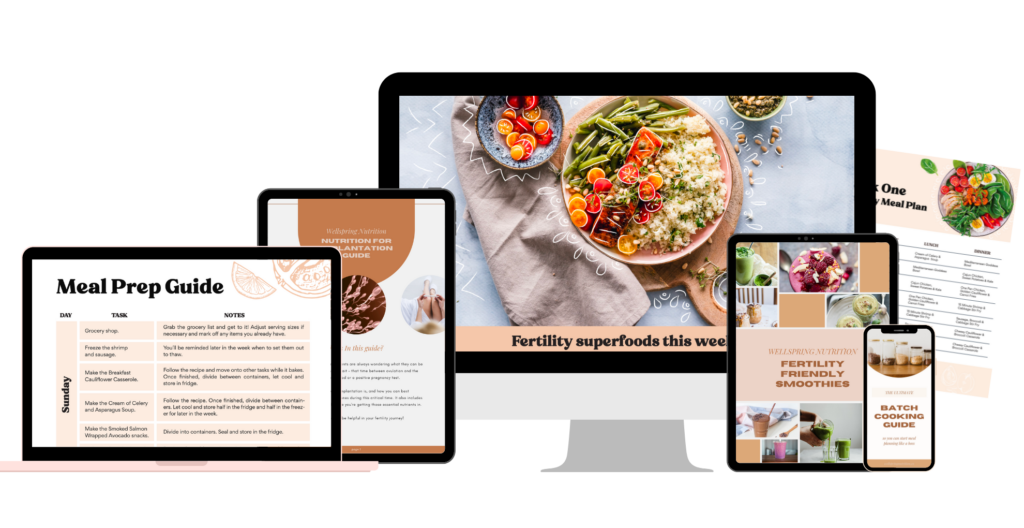
Whether you’re planning your next IUI cycle or are just getting started on your preconception journey, investing in your health is always worth it!
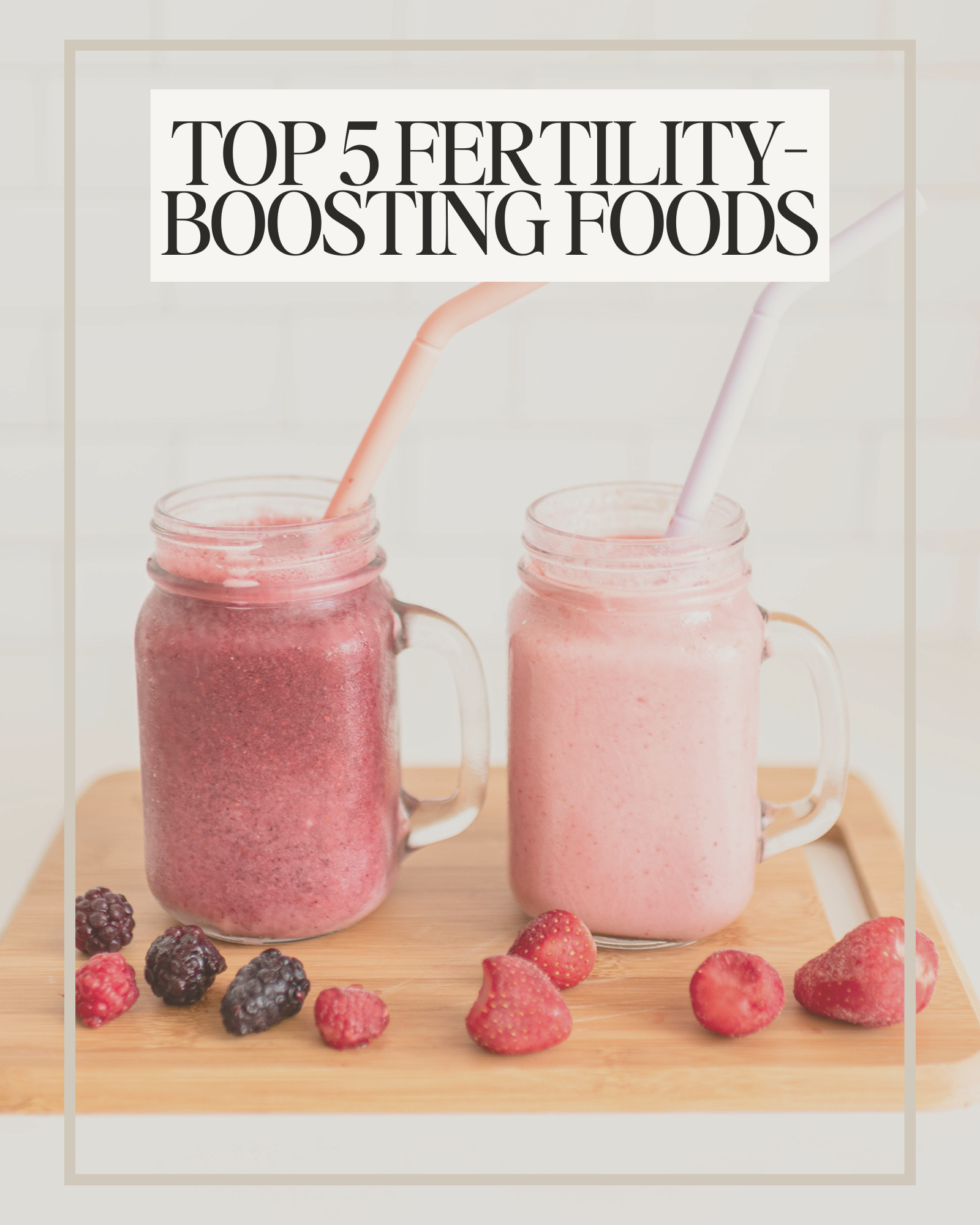
Is gluten and dairy-free good for PCOS? What’s the best diet for me? Maybe you’ve had these same 2 questions swirling around in your head and you are struggling with the right choice. Wellspring Nutrition is here to help clear the confusion!
Is dairy free better for PCOS?
The answer is “Not, exactly”. If you struggle with PCOS and are also trying to get pregnant, full-fat dairy such as Greek yogurt or milk is a better option for you.
These two foods provide healthy carbs and a good amount of protein. Here’s a study showing how the intake of full fat dairy may decrease risk of infertility. On the other hand foods like ice-cream or processed cheese (like American cheese) should be limited because they provide less nutrition.
Women with PCOS can eat moderate amounts of dairy products while also including a balanced diet of other nutrient-rich foods and still see improvement in symptoms. If you choose to eliminate dairy, it is best to discuss this with a dietitian to make sure you are still getting calcium and vitamin D. Non-dairy sources of calcium include tofu, canned sardines or salmon, tahini, dark leafy greens and some non-dairy beverages that state calcium is included.
Does gluten make PCOS worse?
There is a lack of scientific evidence that supports a gluten free diet for PCOS. It’s important to know that there can be a downside to following a gluten free diet if you don’t need to. As a Registered Dietitian and Fertility Expert I want to help make things easier for you. So if you don’t have a gluten allergy or intolerance then it likely isn’t necessary for you to follow a gluten free diet for PCOS.
Removing gluten means not eating nutritious whole grains and possibly missing out on getting enough fiber, iron and B vitamins. Eating whole grains has been shown to reduce the risk of heart disease and diabetes. So let’s make this easy! Keep on reading for how I can help you.
What should I eat if I have PCOS?
Let’s review some very important foods that’ll help decrease your symptoms.
Fruit
Choose a variety of fresh, whole fruit to enjoy. Frozen fruit is a great option! Fruit (and dairy) contain natural sugars that also come with important nutrients like vitamins and minerals. Added sugars such as white sugar, brown sugar, syrup or agave nectar have no additional nutrients like vitamins and minerals. Added sugars are what we want to limit in our daily food choices.
Some women with PCOS are told they can’t eat fruit because of the sugar content – but that’s simply not true! Fruit has important phytonutrients and antioxidants that help decrease inflammation.
It’s just important to pair your fruit (and carbs) with a source of protein or fat.
For example:
Apple + Peanut Butter
Banana + Almond Butter
Nectarine + Cottage Cheese
These small changes will help you balance out your blood sugar, which will then help balance your hormones.
Here are the daily recommendations for added sugars. Keep total added sugars under 25 grams per day for women and under 36 grams per day for men.
Vegetables
Choose a variety of vegetables and eat them daily. There is no one vegetable that’s better than another. Just like fruit, vegetables have important nutrients like vitamins and minerals. Both fruit and vegetables also have fiber, which is important for managing PCOS. A symptom of PCOS can be insulin resistance. In the simplest of terms this means we want to increase the amount of fiber we eat to improve blood sugar control. This in turn helps with insulin resistance and managing PCOS.
It’s recommended that women up to 50 years of age eat 25g of fiber per day. But, more than 90% of women fall short of meeting the recommendations for fiber.
Try tracking your fiber intake for a few days to see how you stack up compared to the daily recommendations!
Protein & Healthy Fats
Including protein with every meal and snack can be very beneficial for PCOS. Protein helps us to feel full and satisfied between meals. This is important so that we avoid overeating and mindless snacking throughout the day. Both of these two things can help maintain a healthy weight.
Examples of good protein choices include lean meats (fish, poultry, lean beef or pork), tofu, beans, lentils, nut butters, eggs, nuts and seeds.
Healthy fats such as polyunsaturated and monounsaturated fats are also important in helping us to feel full and give us energy. We can get some of these healthy fats from fish such as salmon, sardines, avocado, nuts (walnuts, pistachios) and seeds (for example chia and ground flaxseeds).
Whole grains & starchy vegetables
Whole grains and starchy vegetables are considered healthy carbs. They can also be a significant source of fiber. Fiber helps us to feel fuller longer and so it is a great weight management tool. It’s recommended to eat the skin of white potatoes whenever you have them because that’s where a lot of the fiber comes from. White potatoes also have potassium which is important for our blood pressure.
Examples of whole grains: brown rice, wild rice, quinoa, whole grain bread products
Examples of starchy vegetables: potatoes (sweet and white potatoes), green peas, plantains, yucca, and corn.
Are there foods I should limit?
While there are many foods you can eat, you also want to be aware of foods to limit. This simply means we should enjoy them occasionally. We don’t necessarily want to make them daily food choices.
Added sugars
The number one culprit of added sugars in the American diet is still sugar sweetened beverages like soda, energy drinks and even sports drinks. As previously mentioned, keep total added sugars under 25 grams per day for women. Instead try adding fruit, sliced cucumber and/or mint leaves to water.
Saturated fat
Major sources of saturated fat are fried foods, ice cream and desserts. These foods are more like a treat and should be limited.
Processed foods
Processed foods contain very little nutritional value. You’ll also want to watch for eating too many low-fiber foods like white bread, white rice. It’s not that you can never eat them, but if it’s all you eat then we want to think about expanding our food choices. To best manage PCOS we want a healthy diet full of fruit, vegetables, healthy fats, protein and fiber from healthy carbs (whole grains/starchy vegetables).
Other considerations for managing PCOS
Some of our best non-food tools for managing PCOS include exercise, adequate sleep and stress management. We know how hard it can be to exercise throughout the week! You might be thinking, “it’s impossible”, but even small spurts throughout the day add up. For example, if you are able to walk 15 minutes twice per day that’s already 30 minutes!
The recommendations for exercising are 30 minutes 4-5 days out of the week and can help manage symptoms. You can also incorporate strength training two days out of the week.
There is a possible link between stress and higher BMI in women with PCOS. If you are having a hard time managing stress, consider stress reduction strategies like deep breathing, yoga, journaling and yes even exercise. For more, check out this article on “10 Ways You Can Relieve Stress Right Now”.
Research shows that sleep helps to regulate our cardiovascular, immune system and metabolism. Sleep is an important part of being and staying healthy. According to the Sleep Foundation, 7-9 hours of sleep is recommended for ages 18 and up.
Looking for more Support?
Be sure to check out our free live masterclass all about the top 3 ways to naturally enhance your fertility (perfect for those struggling with PCOS and hormone imbalances!)
References:
- Chavarro JE, Rich-Edwards JW, Rosner B, Willett WC. “A prospective study of dairy foods intake and anovulatory infertility.” Hum Reprod. 2007 May;22(5):1340-7. doi: 10.1093/humrep/dem019. Epub 2007 Feb 28. PMID: 17329264.
- Dietary Guidelines for Americans 2020-2025, https://www.dietaryguidelines.gov/food-sources-calcium
- “Gluten-Free Diet: Is It Right for Me?”
- “Added Sugars” https://www.heart.org/en/healthy-living/healthy-eating/eat-smart/sugar/added-sugars
- Dietary Guidelines for Americans 2020-2025, https://www.dietaryguidelines.gov/sites/default/files/2021-03/Dietary_Guidelines_for_Americans-2020-2025.pdf
- The Sugary 6 Infographic, https://www.heart.org/en/healthy-living/healthy-eating/eat-smart/sugar/sugary-six
- “Polycystic Ovarian Syndrome”, https://www.eatright.org/health/pregnancy/fertility-and-reproduction/polycystic-ovarian-syndrome
- “Basu BR, Chowdhury O, Saha SK. Possible Link Between Stress-related Factors and Altered Body Composition in Women with Polycystic Ovarian Syndrome.” J Hum Reprod Sci. 2018 Jan-Mar;11(1):10-18. doi: 10.4103/jhrs.JHRS_78_17. PMID: 29681710; PMCID: PMC5892097.
- “10 Ways You Can Relieve Stress Right Now”, https://health.clevelandclinic.org/how-to-relieve-stress/
- “How Much Sleep Do We Really Need?”, https://www.sleepfoundation.org/how-sleep-works/how-much-sleep-do-we-really-need

Want to know how to boost your fertility diet?
Then you need to learn about Choline! Choline is just as important in helping to prevent neural tube defects as the well known vitamin folate, but unfortunately, it’s not as well known or spoken about. If you’re looking for some choline rich foods for fertility, then read on!
Choline also plays an important role in:
- Supporting the transfer of nutrients across the placenta to ensure your baby receives the nutrients it needs
- Fetal brain development
- May assist in reducing the chances of your baby developing chronic diseases later in life
What’s the data?
The research that has been done over the past 20 years, outlines very clearly the benefits of choline when it comes to both overall health during pregnancy and the development of our babies brain.
Studies on animal models have shown that Choline plays a key role in enhancing brain function and also serves to protect the brain and its various elements as it develops.

Human studies on the other hand have shown that taking Choline in doses higher than what is currently recommended by various health bodies, has multiple benefits, including:
- Enhancing the function of the placenta
- May reduce the risk of preeclampsia
- Improves brain development in the infant
- Boosts reaction times in the infant
- Enhances an infants visual memory
Why haven’t you heard of Choline before?
Unfortunately, the research around Choline is relatively new in scientific terms (by this I mean the research has only really been looking into this topic for the past 20 years), and it’s not a well known supplement when it comes to fertility (well outside of the dietetic community anyway!).
The evidence while not well known, is really promising and it is well worth aiming to include more sources of choline in your diet if you are trying to conceive or pregnant.
So where do you find Choline?
Choline is found in the highest amounts in animal products.

Top Choline Rich Foods for Fertility:
- Eggs
- Salmon
- Beef
- Chicken
- Dairy products
- Soybeans
Like many other nutrients, our choline needs increase dramatically during pregnancy with some studies suggesting that our choline needs may be almost double what is currently recommended by the guidelines.
Should I supplement Choline?
Unfortunately, many of us don’t currently get our choline needs from food alone, and in these cases a supplement may be of benefit to support a healthy pregnancy. Not all prenatal supplements contain Choline, and some also don’t contain enough to provide you with all the benefits. Some of my favorite prenatals that include adequate choline are FullWell Prenatal and Needed.
If you’re already taking a prenatal that doesn’t have choline, consider supplementing or assessing your diet to see if you meet the choline requirements for adequate fertility and pregnancy. You can find more fertility supportive supplements in my fertility dispensary here. Remember, it’s important to ensure that you work with a professional when selecting the right prenatal supplements for you!
Looking for More Support?

Looking for more 1-on-1 support on your fertility journey? Apply for a free 20 minute strategy call today. I can help you regulate your cycles, ovulate, and have a healthy pregnancy using my proven functional nutrition method. I look forward to speaking with you!
References:
- Blusztajn, Jan Krzysztof, and Tiffany J. Mellott. “Neuroprotective actions of perinatal choline nutrition.” Clinical chemistry and laboratory medicine 3 (2013): 591-599.
- Kwan, Sze Ting Cecilia, et al. “Maternal choline supplementation during pregnancy improves placental vascularization and modulates placental nutrient supply in a sexually dimorphic manner.” Placenta 45 (2016): 130. ; Jiang, Xinyin, et al. “A higher maternal choline intake among third-trimester pregnant women lowers placental and circulating
- Boeke, Caroline E., et al. “Choline intake during pregnancy and child cognition at age 7 years.” American journal of epidemiology 12 (2012): 1338-1347.
- What Is Choline? An Essential Nutrient With Many Benefits (healthline.com)

Like many of my clients and readers, I was given hormonal birth control with absolutely no discussion on the side effects of the pill. I was handed the pill and never really thought twice about it. I just knew it gave me a “regular” period and would help me protect against an unwanted pregnancy. It was only in my THIRTIES that I discovered how the pill depletes certain nutrients, affects mood, weight, and so much more. If you’re curious about which nutrients are depleted on hormonal birth control, then keep reading on.
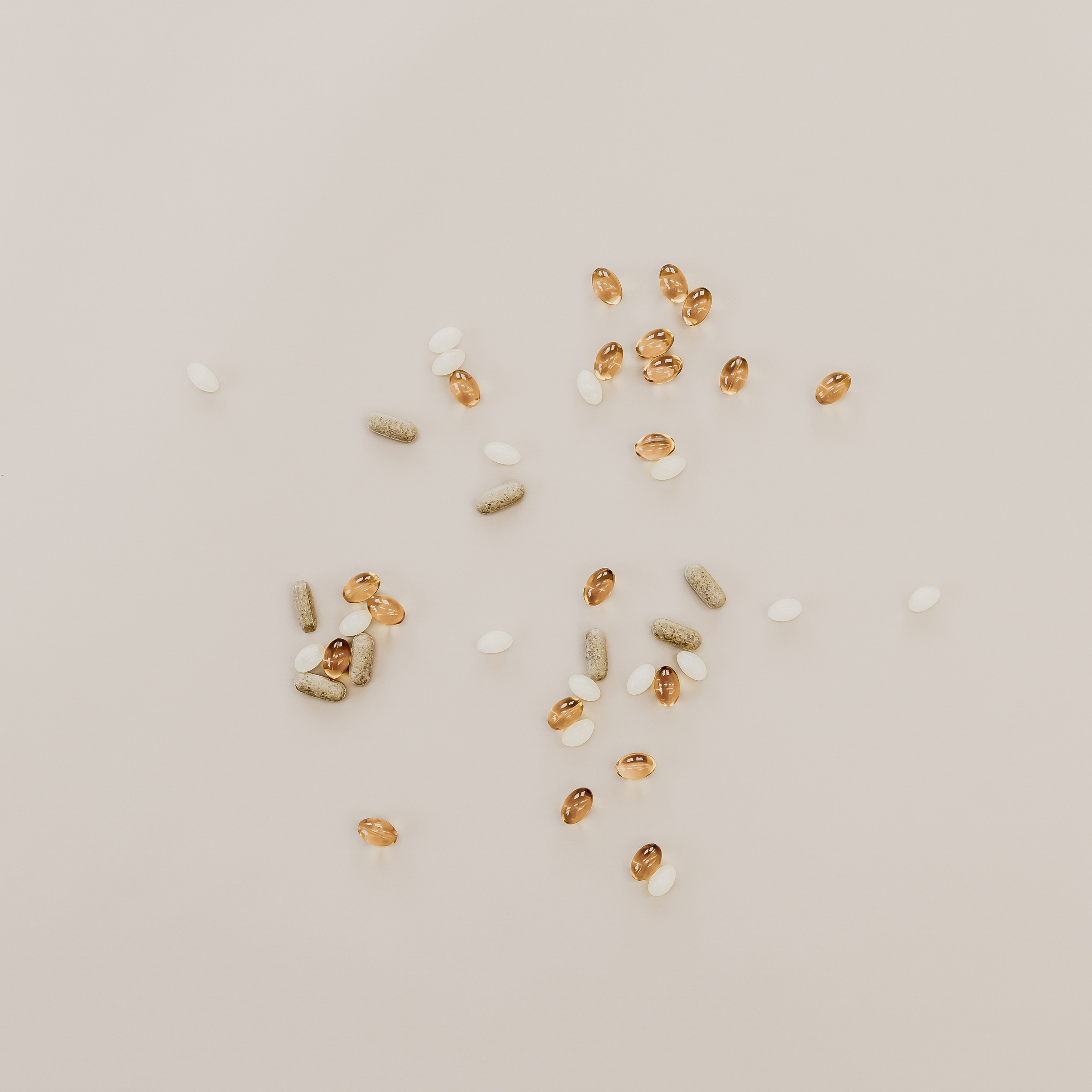
8 Nutrients depleted on hormonal birth control and how they impact fertility:
Zinc
Found in foods such as eggs, seafood, meat, nuts, seeds, beans and whole grains. Zinc plays an important role in both egg and sperm health.
Magnesium
Found in foods such as avocado, banana, seafood, green leafy vegetables, nuts and seeds. Magnesium plays an important role in sleep, bone health and our muscles ability to relax.
Vitamin C
Found in foods such as oranges, broccoli, kiwi fruit and guava. Vitamin C is a valuable antioxidant that keeps our eggs and sperm protected from oxidative stress caused by free radicals.
Folate
Found in green leafy vegetables and fortified breads and cereals. Folate is essential when trying to conceive and helps to prevent the formation of neural tube defects in early pregnancy.
Selenium
Found in foods such as Brazil nuts, meats and seafood. Selenium plays a valuable role in our thyroid function and helps to prevent sperm from mutating or becoming damaged.
Vitamin B2
Found in eggs, meats and dairy products. Vitamin B2 is a common nutrient depleted when on the pill and is often the culprit behind those pesky headaches!
Vitamin B6
Found in foods like breads and cereals. Vitamin B6 is commonly depleted in those taking the pill. It plays an important role in fertility and the luteal phase of the menstrual cycle.
Vitamin B12
Found in foods such as fish, beef, and fortified cereals. B12 is essential for healthy cell formation, a must when trying to conceive.
Ideally you would want to ensure that these levels are checked and corrected where necessary before you start thinking about conceiving to ensure a healthy baby and pregnancy. You can start a prenatal, a few months before coming off the pill to help with the transition of coming off.
Wondering what else you can do to support your body when coming off the pill?
Let’s face it, coming off the pill can be a scary thought and can lead to some not so nice side-effects including:
- Post-pill amenorrhea
- Painful, heavy periods
- Irregular cycles that are hard to predict
- Acne
- Headaches or migraines
- Changes in weight (loss or gain)
- Changes to mood
- Digestive upset (IBS like symptoms)
- Breast tenderness
Supporting your body through nutrition can be a great way to make the transition easier.
Try these 9 tips to support your body when coming off the pill

- Aim to have at least 1 bowel movement each day to facilitate the removal of excess estrogen in the body.
- Eat plenty of cruciferous vegetables to lower estrogen levels – try eating 1 cup of bok or pak choy, broccoli, cabbage, cauliflower, arugula and Brussel sprouts each day!
- Eat regularly – aim to eat every 2-3 hours to support blood sugar and hormone balance. Putting your body under too much stress can increase the stress hormone cortisol.
- Eat enough fibre to encourage regular bowel movements – aim to eat between 3-6 cups of colourful, leafy vegetables each day.
- Eat lean protein to support your detox pathways – try turkey, chicken, pork, beef, and seafood.
- Include plenty of healthy fats to support hormone creation – try extra-virgin olive oil, avocado, nuts and seeds.
- Stay hydrated by drinking plenty of water – aim for at least 8 cups per day.
- Try to avoid highly processed foods – think sugary foods, fast foods and refined oils.
- Avoid alcohol if you can! Alcohol is also removed via our liver, so give it a break if you can.
References:
- How Birth Control Pills Affect Your Nutritional Needs – Scientific American
- Oral contraceptives and changes in nutritional requirements – PubMed (nih.gov)
Looking for more support with your fertility? Book your free 30 minute 1:1 strategy call with me to learn how I can support you using functional nutrition, specialty lab testing, and targeted supplements. Can’t wait to speak to you!

You may be thinking – I don’t need to work with a fertility dietitian / nutritionist, I already eat pretty healthy (weekend margs don’t count right?), I exercise, drink my green juices … and besides, I can get any nutrition information I really need through Google.
Well, my friend… I’m here to break down five benefits of working with a fertility dietitian nutritionist, specifically one that works in a functional nutrition capacity. I think some of these may surprise you!

1. Breaking down your relationship with food
Okay, we all have our issues with food. To say that eating is not emotional… well it’s just not what I’ve seen in my practice and in life. We all eat emotionally from time to time, even if it’s happy emotions like birthday cake, or holiday meals.
But when our relationship to food becomes restrictive or consumes our thoughts, it’s time to work with a professional who understands what you’re going through.
For many women struggling with fertility, food can be very time consuming. We’re told not to eat gluten or dairy or cut out coffee completely. We’ve heard of different fertility diets, and can easily spiral into the trap of thinking that every bite we take is going to either get us pregnant or leave us feeling miserable.
Working with a fertility dietitian that can help you set up your meals in a way that supports your fertility, but also leaves room for enjoyment is key. I mean, what is a life without pizza anyway?
2. Accountability

Raise your hand if you’ve ever tried to take on a new hobby or something to improve yourself only to find yourself giving up a few weeks later? 👋🏼
A few years ago, I decided I wanted to take up surfing – I bought a foam board off Craigslist, rented a wet suit, and out I went into the ocean. As I splashed around the water, and even got tumbled by some waves I felt exhilarated by the cold Pacific ocean and glimmer of water in the sun.
Maybe I went out a few more times, but soon enough, I lost momentum. I didn’t have anyone to go with, no one to learn some new moves with or a partner to go with before or after work.
We all have the best of intentions when we start something new. But having accountability is key. And your dietitian is always going to keep you accountable to what you said you wanted for yourself.
3. Test, don’t guess
When you work with a functional nutrition dietitian (hey, hello!) – you’re likely going to be introduced to some new functional lab tests. Tests like the DUTCH hormone test, GI MAP stool test, Spectracell micronutrient testing, food sensitivity testing and more.

The reason for this is because you’ve likely already had some conventional lab tests done in the past. The problem with this is that you’re still trying to get pregnant and have no answers. By the way… “unexplained infertility” is not an answer.
This is where a deeper dive into your gut, hormones, and nutrient levels is so important. For example, most people don’t realize that they’re probably deficient in vitamin D – a key vitamin (that acts as a hormone) needed for fertility.
Or maybe you’ve had heavy periods your whole life, but didn’t realize that your messed up gut health is actually impacting your estrogen levels, causing you to put on weight, and have heavy painful periods.
Working with a functional nutrition dietitian is going to be key to understanding the root cause of your issues.
4. You have PCOS and you’re kind of freaking out
One of the most common hormone disrupting conditions for women of reproductive age is PCOS. It can feel really scary when you get the diagnosis and you may think you’ll never be able to get pregnant without hormone therapy – WRONG. Just wrong.
Instead of jumping to medications and pills, you can work with a fertility dietitian who will help you manage your diet and lifestyle specifically for PCOS, so that you can have regular periods, and optimize your chances of getting pregnant naturally.
PCOS is not a death sentence, and there are plenty of women with the condition who get pregnant (and have healthy pregnancies) without assistive reproductive technology.

5. You know your diet could be better and you just want to make sure you have a healthy pregnancy
Well, good on you girl for being uber prepared for pregnancy.
Did you know that the best time to start taking prenatal vitamins and working on your diet is actually 6 months BEFORE you plan to start trying?
Working with a fertility dietitian is going to be huge for you, because you’re making sure you get all the nutrients you and baby need, so by the time that first trimester rolls in and all you want is bagels and crackers- you’ve already stored up the necessary nutrients to ensure baby is getting everything they need.

So tell me, which one applies to you? If you’re thinking you might benefit from working with a fertility dietitian, book your free discovery call with me today.
We’ll talk through what your goals are and how I might be able to help you on your journey towards becoming a mama.

The Preconception Playbook
This free playbook provides specific actionable tips to get started on your fertility journey, as well as what to avoid while you're trying to conceive.
Get the free playbook
